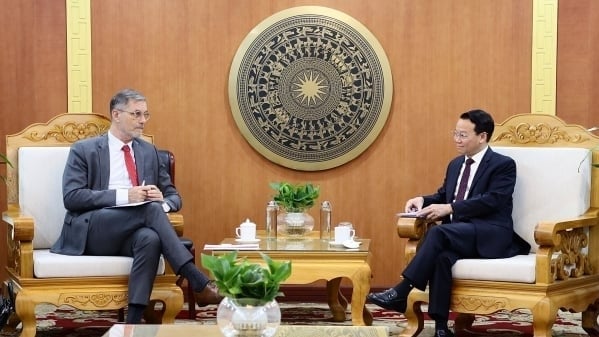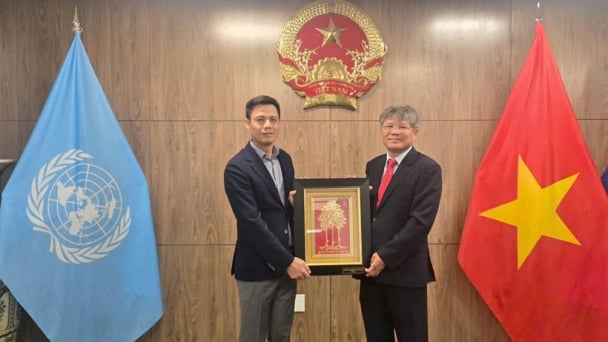May 22, 2025 | 17:20 GMT +7
May 22, 2025 | 17:20 GMT +7
Hotline: 0913.378.918
May 22, 2025 | 17:20 GMT +7
Hotline: 0913.378.918
However, defining what exactly "professional" seems to be a challenge will need more research, comparisons, and perhaps the creation of a textbook for farmer training courses, agricultural extension workers, and officials at all levels of the Association of Farmers. The purpose of this article is to describe the first ideas associated with the gathering and experience.
Our farmers have been working in agriculture for centuries and are proud of their accomplishments. An elderly farmer can boastfully say: "Us farmers can even grow with our eyes closed." This is very true since our ancestors ushered this land, prior generations had mastered the art of sowing seed into the soil, growing rice plants, and delivering fragrant rice to the table daily.
When a guest arrives, the proprietor offers him a feast prepared using vegetables and fish farmed right on the premises. So why do we need a "professional farmer"? While "professional" is distinct from "unprofessional" or "not yet professional," how is it distinct from our forefathers' generation of farmers hundreds of years ago?
Farmers' livelihoods have shifted from adequate to plentiful, and they now sell their goods to others. Additionally, the sell-buy transactions always consider the profit generated.
The greater the profit, the more goods sold; the greater the number of products sold, the greater the yields required... and when increased production reaches a point where it cannot be sustained, the usage of growth and weight gain agents becomes inevitable. Such an inflexible regulation persisted for decades.
However, the rule becomes outdated and incompatible with the rapid evolution of consumption trends.
The community is becoming more prosperous, and as a result, it has shifted from eating to fullness to consuming clean, nutrient-dense, and nutritious meals. Thus, a "professional farmer" is someone who understands how to create products that meet the requirements of the market rather than his own.
The supply-demand rule determines the price. What is plentiful is inexpensive, but what is rare is costly. Consumers will undoubtedly pick the goods with the more competitive pricing if the product is of the same quality.
Thus, the producer must understand the invisible rule and how to produce to guarantee quality while maintaining the lowest feasible price. The low price is the consequence of both a decrease in quantity and an increase in production materials.
If farmers want to decrease prices, they must engage in cooperative economies; if they wish to minimize raw material production, they must adhere to standardized processes based on the recommendations of scientists and experts. Thus, a "professional farmer" is someone who understands how to produce efficiently and affordably while maintaining quality.
Historically, farmers would wait for merchants to come and purchase from their fields and gardens after harvesting. Today, it is essential to identify, store, and process a variety of high-value-added goods. Thus, farmers must be intelligent, which can only be acquired via education. Knowledge is limitless: production knowledge, applied science and technology knowledge, information technology knowledge, and business knowledge, to name a few. Thus, a "professional farmer" is someone who has both knowledge and comprehension, production abilities, and economic reasoning.
Our nation is experiencing climate change, severe weather, dwindling alluvium, land depletion owing to a never-ending production cycle, and an increase in illness. Farmers have been forced to use, and sometimes abuse pesticides.
As a result, agricultural goods include residues of hazardous chemicals that are harmful to consumers' health, eliciting their hesitation and mistrust. Additionally, toxic substances degrade the natural environment, disrupting the ecosystem's balance. Thus, a "professional farmer" is first and foremost a person with a conscience, who considers the health of others and the common interests of the community, who has the knowledge and acts in the interest of sustainable agriculture for todays and future generations.
To raise the size of production, farmers must understand how to collaborate and follow a standardized procedure and how to arrange service operations cooperatively to enhance revenue. Collaborating requires people to work not for their personal profit but the benefit of others. Thus, a "professional farmer" is someone who recognizes the value of collaboration and actively engages in collective economic groups voluntarily.
To think larger, acquire a wider vision, and want more passionately, farmers must go beyond their immediate surroundings and establish connections with intercommunal, interdistrict, interprovincial, and interregional areas. And students may use the opportunity to interact with scientists, professionals, and companies to expand their knowledge, skills, and contacts... Thus, a "professional farmer" is an empathetic individual who is always seeking to extend the communication space by actively cultivating social connections.
Numerous studies have shown that numerous illnesses, such as high blood pressure, which impairs the body's immunity, are often caused by stress, worry, pessimism, or despair. Thus, a "professional farmer" is someone who is in good physical and mental condition, with an abundance of passion and a supple, healthy physique.
Professional farmers are descended from individuals who live well and conduct themselves ethically. Kindness starts with the word CREDIT, a simple word that may bring someone success or disaster.
Professional farmers are necessary for the establishment of professional agriculture. Rather than lamenting the farmer's situation, let us work to steer the farmer toward professionalism.
To do this, many training courses are required to enhance fundamental knowledge, nurture skills, offer professional development, and provide an open environment for farmers to access and connect to new, varied, and rich things in society. This is the narrative of the country's agricultural development as it has survived.
Therefore, do not follow as a movement or abandon an incomplete job. “Tomorrow starts now...”
Translated by Linh Linh
![Reducing emissions from rice fields: [3] New values generated from carbon credit](https://t.ex-cdn.com/nongnghiepmoitruong.vn/608w/files/content/2025/05/19/dsc09613-144700_71-150957.jpg)
(VAN) In addition to helping safeguard the environment, the low-emission rice cultivation model also generates new opportunities for farmers by leveraging the carbon credit market.
![Ho Chi Minh city adapts to climate change: [1] Vulnerable in the whirlwind of development](https://t.ex-cdn.com/nongnghiepmoitruong.vn/608w/files/duyenht92/2025/05/19/3131-ngap-nongnghiep-163121.jpg)
(VAN) As the country's economic engine with a rapid urbanization rate, Ho Chi Minh city is facing increasingly serious consequences of climate change.

(VAN) On May 21, Minister of Agriculture and Environment Do Duc Duy worked with Mr. Olivier Brochet, Ambassador Extraordinary and Plenipotentiary of the French Republic to Vietnam.

(VAN) VRG recently conducted a visit and working trip to the United States to demonstrate its efforts in redefining the role of rubber enterprises in the global value chain.

(VAN) In 2024, over 295 million people across 53 countries and territories faced acute hunger—an increase of almost 14 million people compared to 2023, while the number of people facing catastrophic levels of hunger reached a record high.

(VAN) World Environment Day 2025 (June 5) carries the theme 'Beat Plastic Pollution' continuing to emphasize the global urgency of addressing the plastic waste crisis.

(VAN) This was the assessment shared by experts at the workshop titled 'Assessing the Role and Potential of Low-Emission Rice Production Systems in Vietnam,' held on the morning of May 19.